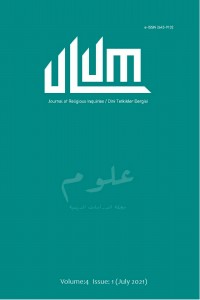A Quantitative Evaluation of the Experiences of Faculty Members and Students at the Faculty of Theology/Islamic Sciences regarding Distance Education System during the Covid-19 Pandemic
Abstract
During the Covid-19 pandemic, lectures have been delivered through distance education since the Spring Semester of the 2019-2020 Academic Year at the faculties of theology/Islamic sciences, as has been the case at all educational levels in our country. The purpose of this study is to investigate the perceptions of the students and faculty members of the faculty of theology/Islamic sciences, regarding the impacts of distance education on higher religious education, its advantages and disadvantages, along with problems encountered in this medium of education. In this quantitative study, the data were collected using two online surveys, one of them being for students and the other for faculty members. The data obtained from the participants were analyzed using SPSS v24. The population of the study was the faculty members and students of the faculty of theology/Islamic sciences in Turkey. The sample of the study was selected from a group of faculty members and students at 25 faculties of theology/Islamic sciences dispersed across the seven geographical regions in Turkey.
Keywords
Distance Education Faculty of Theology Faculty of Islamic Sciences the Covid-19 Pandemic Higher Religious Education
References
- Cevizci, Ahmet. Eğitim Sözlüğü, İstanbul: Say Yayınları, 2010.
- Creswell, John W. Eğitim Araştırmaları: Nicel ve Nitel Araştırmanın Planlanması, Yürütülmesi ve Değerlendirilmesi, çev. Selçuk Doğan – İsmail Karsantik. İstanbul: EDAM Yayınları, 2017.
- Dikmen, Semih ve Bahçeci Ferhat, Covid-19 Pandemisi Sürecinde Yükseköğretim Kurumlarının Uzaktan Eğitime Yönelik Stratejileri: Fırat Üniversitesi Örneği, Turkish Journal of Educational Studies, 7 (2) Mayıs 2020, 78-98.
- Erden, Münire. Eğitim Bilimine Giriş. Arkadaş Yayınevi, Ankara, 2017.
- Gamgam, Hamza-Altunkaynak, Bülent. Parametrik Olmayan Yöntemler Spss Uygulamalı, Ankara: Gazi Kitapevi, 2008.
- Gürbüz, Sait ve Şahin, Faruk. Sosyal Bilimlerde Araştırma Yöntemleri Felsefe-Yöntem- Analiz. Seçkin, Ankara, 2016.
- http://www.tuba.gov.tr/files/images/2020/kovidraporu/Covid-19%20Raporu-Final%2B.pdf erişim 20.02.2021.
- https://lastatalenews.unimi.it/covid-19-primo-mese-didattica-online-statale erişim 20.02.2021
- https://www.ilo.org/wcmsp5/groups/public/---ed_protect/---protrav/-- travail/documents/briefingnote/wcms_745450.pdf erişim 20.02.2021.
- https://www.medyasiirt.com/gundem/yuksek-ogretimde-dijital-donusum-projesinde-imzalar-atildi-h13197.html erişim 20.02.2021.
- https://www.yok.gov.tr/Sayfalar/Haberler/2020/uzaktan-egitime-yonelik-degerlendirme.aspx erişim 20.02.2021.
- https://www.yok.gov.tr/Sayfalar/Haberler/2020/uzaktan-egitim-platformu-saglama-protokolu.aspx erişim 01.03.2021.
- Karasar, Niyazi. Bilimsel Araştırma Yöntemi, Ankara: Nobel Yayıncılık, 2016.
- Kaya, Zeki. Uzaktan Eğitim, Ankara: Pegem A Yayınları, 2002.
- Nuroğlu, Elif - Nuroğlu, Hüseyin. “Türkiye ve Almanya’nın Sanayide Dijital Dönüşümü: Yol Haritaları ve Şirketlerin Karşılaştırılması,” Süleyman Demirel Üniversitesi İktisadi ve İdari Bilimler Fakültesi Dergisi 23/ (2018), 1537-1560.
- Özdamar, Kazım. Paket Programlarla İstatistiksel Veri Analizi-1, Eskişehir: Kaan Kitabevi, 2002.
Abstract
References
- Cevizci, Ahmet. Eğitim Sözlüğü, İstanbul: Say Yayınları, 2010.
- Creswell, John W. Eğitim Araştırmaları: Nicel ve Nitel Araştırmanın Planlanması, Yürütülmesi ve Değerlendirilmesi, çev. Selçuk Doğan – İsmail Karsantik. İstanbul: EDAM Yayınları, 2017.
- Dikmen, Semih ve Bahçeci Ferhat, Covid-19 Pandemisi Sürecinde Yükseköğretim Kurumlarının Uzaktan Eğitime Yönelik Stratejileri: Fırat Üniversitesi Örneği, Turkish Journal of Educational Studies, 7 (2) Mayıs 2020, 78-98.
- Erden, Münire. Eğitim Bilimine Giriş. Arkadaş Yayınevi, Ankara, 2017.
- Gamgam, Hamza-Altunkaynak, Bülent. Parametrik Olmayan Yöntemler Spss Uygulamalı, Ankara: Gazi Kitapevi, 2008.
- Gürbüz, Sait ve Şahin, Faruk. Sosyal Bilimlerde Araştırma Yöntemleri Felsefe-Yöntem- Analiz. Seçkin, Ankara, 2016.
- http://www.tuba.gov.tr/files/images/2020/kovidraporu/Covid-19%20Raporu-Final%2B.pdf erişim 20.02.2021.
- https://lastatalenews.unimi.it/covid-19-primo-mese-didattica-online-statale erişim 20.02.2021
- https://www.ilo.org/wcmsp5/groups/public/---ed_protect/---protrav/-- travail/documents/briefingnote/wcms_745450.pdf erişim 20.02.2021.
- https://www.medyasiirt.com/gundem/yuksek-ogretimde-dijital-donusum-projesinde-imzalar-atildi-h13197.html erişim 20.02.2021.
- https://www.yok.gov.tr/Sayfalar/Haberler/2020/uzaktan-egitime-yonelik-degerlendirme.aspx erişim 20.02.2021.
- https://www.yok.gov.tr/Sayfalar/Haberler/2020/uzaktan-egitim-platformu-saglama-protokolu.aspx erişim 01.03.2021.
- Karasar, Niyazi. Bilimsel Araştırma Yöntemi, Ankara: Nobel Yayıncılık, 2016.
- Kaya, Zeki. Uzaktan Eğitim, Ankara: Pegem A Yayınları, 2002.
- Nuroğlu, Elif - Nuroğlu, Hüseyin. “Türkiye ve Almanya’nın Sanayide Dijital Dönüşümü: Yol Haritaları ve Şirketlerin Karşılaştırılması,” Süleyman Demirel Üniversitesi İktisadi ve İdari Bilimler Fakültesi Dergisi 23/ (2018), 1537-1560.
- Özdamar, Kazım. Paket Programlarla İstatistiksel Veri Analizi-1, Eskişehir: Kaan Kitabevi, 2002.
Details
| Primary Language | English |
|---|---|
| Subjects | Religious Studies |
| Journal Section | Research Articles |
| Authors | |
| Publication Date | July 31, 2021 |
| Submission Date | July 26, 2021 |
| Published in Issue | Year 2021 Volume: 4 Issue: 1 |



